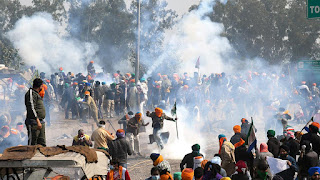Introduction: In the
bustling streets of India, amidst the vibrant tapestry of cultures and
livelihoods, a resounding call for justice echoes. The Farmers' Protest in
India in 2024 has gripped the nation, underscoring the struggle of the agrarian
backbone against systemic inequities. As tractors and trucks line the roads
leading to New Delhi, the demands of the protestors reverberate, challenging
the status quo and igniting conversations on socio-economic justice.
Context and Background: The genesis of the Farmers' Protest in India traces back to the
passage of contentious agricultural laws by the Modi government. These laws,
purportedly aimed at reforming the agricultural sector in a neoliberal line,
faced staunch opposition from farmers who perceived them as threats to their
livelihoods. As media reported,
the laws allowed for direct selling to bulk buyers and eased contract farming,
triggering concerns about exploitation and market dominance. Despite assurances
from the government, demonstrators remained apprehensive, fearing the erosion
of their rights.
The central government had to withdraw the
Farmers’ Produce Trade and Commerce (Promotion and Facilitation) Act, The
Farmers (Empowerment and Protection) Agreement of Price Assurance and Farm
Services Act, and The Essential Commodities (Amendment) Act after the 2021
Farmers’ protests.
Demands and Grievances: At the heart of the protests lie multifaceted demands reflecting the
myriad challenges faced by the agrarian community. The rallying cry for a
Minimum Support Price (MSP), as highlighted by the media, underscores the
urgent need for economic security amidst volatile market conditions. Farmers
seek not only financial safeguards but also debt waivers, compensation for
deceased comrades, and assurances against the privatization of essential
services like electricity. These demands, emblematic of broader structural
issues, underscore the systemic neglect faced by farmers for decades.
Government Response and Policies: In response to the protests, the Modi government unleashed a
formidable crackdown, as documented by media reports.
Tear gas, barricades, and internet suspensions became tools of suppression,
reflecting a government determined to suppress dissent. Despite sporadic
negotiations, trust eroded, with farmers decrying broken promises and
government apathy. The standoff underscores a deeper ideological chasm, pitting
agrarian livelihoods against corporate interests, with ramifications for
India's socio-political landscape.
Protest Dynamics and Impact: The current Demonstration in India unfolds against a backdrop of
resilience and solidarity. United under banners like the Samyukta Kisan Morcha and Kisan
Mazdoor Morcha, farmers exemplify collective action in the face of
adversity. The protests reverberate beyond Delhi's borders, galvanizing support
from diverse segments of society. From youth activists to trade unions, the
movement transcends traditional boundaries, amplifying the voices of the
marginalized and disenfranchised.
Implications and Future Outlook: As the protest persists, in India it serves as a poignant reminder of
the power of grassroots movements in shaping national discourse. Amid the
continuing protest, the farmers' coalition known as Samyukta Kisan Morcha
(SKM), supported by the unified platform of Central Trade Unions (CTUs), has
announced the nationwide 'Grameen Bandh' or rural
strike scheduled for Friday, February 16th.
Beyond immediate policy demands, this demonstration
underscores deeper questions of social justice and equitable development. The
government's response, in turn, reflects broader challenges of democratic
governance and inclusive policymaking. As the nation grapples with the
complexities of agrarian distress, the outcome of the protests remains
uncertain, yet their impact on India's socio-political fabric is indelible.
Conclusion: This Protest in India in 2024 transcends mere agricultural grievances; it embodies a collective quest for dignity, justice, and empowerment. As the movement evolves, it beckons us to reckon with systemic inequalities and envision a more inclusive future. In the labyrinth of political manoeuvring and public discourse, the voices of the farmers resonate, urging us to heed their call for change. In their struggle lies the promise of a more equitable India, where the seeds of dissent yield the fruits of transformation.
15.02.24
---






No comments:
Post a Comment